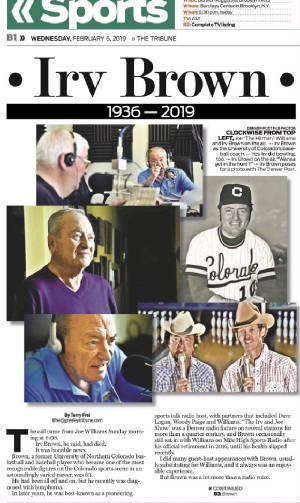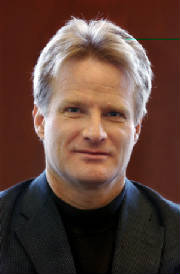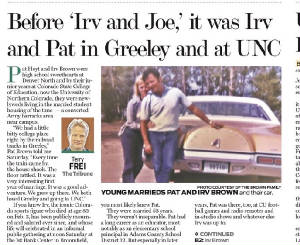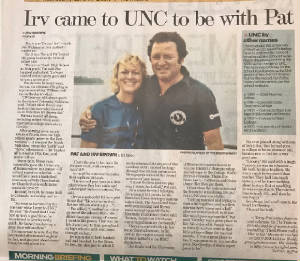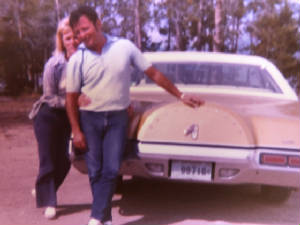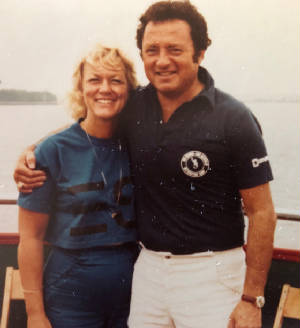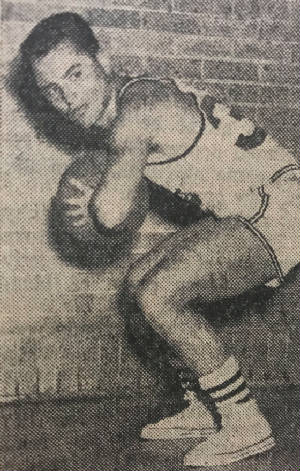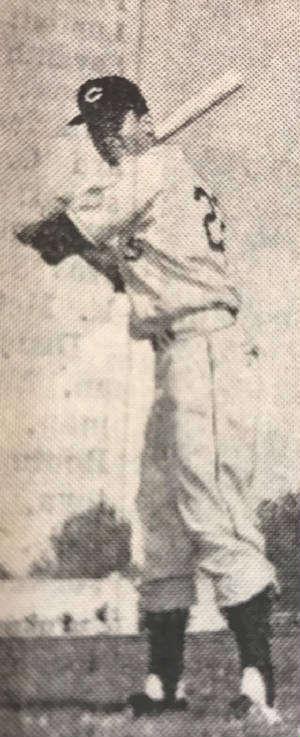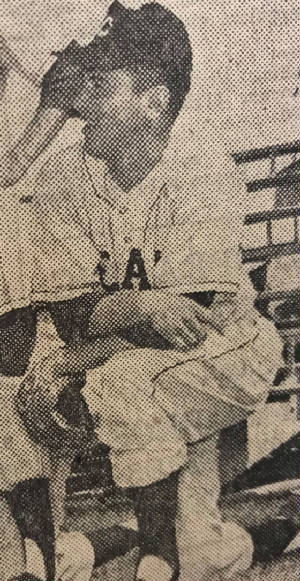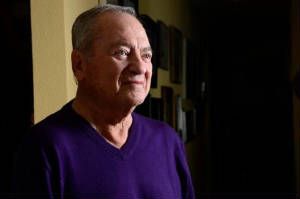
Irv Brown.
The call came
from Joe Williams Sunday morning at 8:08.
Irv Brown, he said, had passed away.
It was horrible news.
Brown, a former University of Northern Colorado
basketball and baseball player who became one of the most recognizable figures on the Colorado sports scene in an astoundingly
varied career, was 83.
He had been ill off and on, but he recently was diagnosed with lymphoma.
In later years, he was best-known as a pioneering
sports talk radio host, with partners that included Dave Logan, Woody Paige and Williams. “The Irv and Joe Show”
was a Denver radio fixture on several stations for more than a quarter century, and Brown occasionally still sat in with Williams
on Mile High Sports Radio after his official retirement in 2016, until his health slipped recently.
I did many guest-host appearances
with Brown, usually substituting for Williams, and it always was an enjoyable experience.
But Brown was a lot more than a radio voice.
This is going
to be a long paragraph and not even complete. Brown also was a seven-time letterman at Denver North High School; coached and
taught at Arvada High School; was head baseball coach at the University of Colorado and Metropolitan State College; was a
prominent college basketball referee, working six Final Fours; served as commissioner for the Colorado Athletic Conference;
was the television analyst on Denver Nuggets broadcasts; was an analyst for many early ESPN events, everything from bowling
to the College World Series; and was legendary for, it seemed, his far-reaching memory of anything and everyone in Colorado
sports since, well, to use one of his favorite expressions, since Hector was a pup.
His self-deprecating sense of humor also was renowned.
Of his time
at Arvada High, he would say: “I was an educator. Not a good one, but I was an educator.”
Of his time as CU’s baseball coach, and a highly respected
one, he would say: “I made CU baseball what it is today. Extinct.” (CU dropped the program in a budget-cutting
move.)
High-profile basketball coaches, including Bobby Knight and others with strained relationships with the media, would
go out of their way to be on Brown’s radio show and tease him before eventually saying they respected him as a fair
referee who called games by feel and judgment, not the rulebook — which he claimed to have never read.
When he did radio “remotes,”
with the show at sponsors’ locations, he would ask anyone who approached him to talk during breaks for a business card,
then plug them on the air in the next segment. He could make a hosting store’s assistant manager or a sports bar waitperson
sound or feel like the CEO of a Fortune 500 company. Or in his travels around town, courting sponsors and otherwise, he would
collect business cards, stack them next to him on the show and as a break approached, pick one up and say, “Let me tell
you about a guy …”
And Irv’s memory …
He actually remembered me as a high school baseball catcher at Wheat Ridge,
including as part of the Logan & Frei battery, and each time he mentioned that when I was on the air with him, I became
a better player.
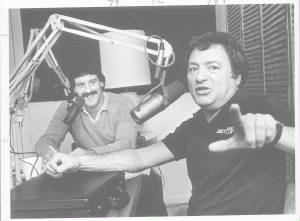
Dave
Logan and Irv Brown in the studio in 1986.
When I was on, he also loved telling (and retelling)
the story of being transfixed as he heard Mike Burrows of the Colorado Springs Gazette at the Broncos training camp ask my
father, Jerry, by then a team scout and administrator, about his World War II service as a P-38 fighter pilot in the Pacific
Theater. Few knew about it. Mike, an aviation aficionado, drew him out, and Irv never forgot being among those listening,
amazed.
Williams,
known as the “Hit Man,” still does an hour daily show for Mile High Sports radio. Brown had been ill and Williams
had braced himself, but he still was shaken Sunday when the news came.
“He’s the one that hired me and somebody like
me today would never be hired to do what we did,” Williams told me. “That was a different time and a different
era. There was something about Irv. He was always trying to get people jobs. That’s how he was. But when you talk about
sports in the state of Colorado, I don’t think there’s anybody in this state who touched more lives than Irv Brown
did. I saw it down through the years with everybody who was anybody. And he always remembered their names. I couldn’t
get over that. They might have to jiggle him a little bit, but he’d come up with it. He was one of a kind. We all know
that.
“It’s
just a sad day. It really is. I wish it could have been longer.”
When I asked Williams for a summing-up story about Brown, he said, “Oh, I don’t
know which ones to pick. I have a million stories.”
Williams laughed, paused, and then said, “All these legendary college
basketball coaches, every one of them, knew Irv and really respected him. I never saw anything like that. Usually college
coaches, they’re the kings of the court, the kings of the school, they are the dictators and they don’t bow down
to anybody. You know how they are. I’ve met most everybody through Irv, of course, and been out with many of them at
Final Fours and regionals.”
Williams said the coaches would razz Brown, citing games of years ago and allegedly bad calls, but
ultimately say they respected him.
“I remember talking to (Syracuse’s) Jim Boeheim,” Williams said. “He did
tell me one time when we were sitting at a bar, ‘One thing about Irv, if we were playing at home, I knew we were in
trouble. If we got him on the road, I knew we had a chance.’ And the coaches all felt that way.”
Logan, the former CU football
All-American and long-time NFL receiver with the Browns and Broncos, is the football coach at Cherry Creek High, a talk-show
host in KOA’s afternoon drive time, and the Broncos’ radio voice. Brown got him his start in the media.
Logan was
devastated when he heard the news Sunday. I had texted him. I was not alone.
“I got up and my phone was blown up,” Logan told
me. “That’s bad news…There aren’t too many people who have a bad word to say about Irv. He was just
a great, great human. Gosh, I don’t even know where I would start.”
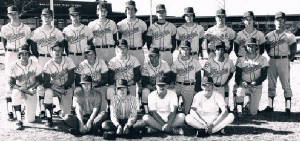
Six
degrees of separation. The Wheat Ridge Farmers in … . Dave Logan is fifth from left in the back row and his batterymate,
Terry Frei, is third from right, middle row. Coach Steve Bell, at right in back row, had played for Irv Brown at Arvada and
picked up his coaching methods — including the %$#&^% thumb drill. Logan got his start in radio after NFL retirement
through Irv Brown, Frei sat in many times with Brown as a guest or substitute co-host.
Logan then flashed back to when
they both were at CU, and Logan — who had been drafted by the Cincinnati Reds in baseball and also played basketball
for CU — hoped to play baseball for the Buffs, too. For Brown.
“I had it already set up with coach (Eddie) Crowder
and in the spring I was going to play baseball,” Logan said. “Coach Crowder got fired, Coach (Bill) Mallory came
in and said, ‘You’re not playing baseball. You’re playing spring football.’ That was when I first
knew Irv.
“Then
later, Irv and Joe gave me my start in radio. I had called Irv when I retired from the NFL and we had stayed in touch quite
a bit during my career. He said, ‘What are you going to do?’ I said, ‘I don’t know.’ …
He said, ‘Why don’t you come and do a Super Bowl preview show with me.’ I did, an hour show, and he said,
‘Hey, the boss loves it, he wants to know if you can do full time.'”
Logan sat in with Williams when Brown was out
of town, doing Nuggets television work, and that was his start.
“It sort of took off from there,” Logan said. “I loved
the guy. We remained friends. I had such respect and love for him.”
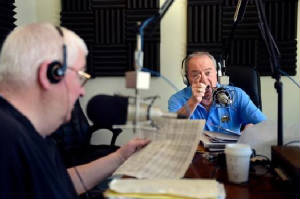
Joe
“The Hitman” Williams and Irv Brown on the air.
Logan and I both played baseball at Wheat Ridge for Steve
Bell, who had played for Irv at Arvada and used most of Irv’s coaching strategies, including the infamous “thumb
drill.” When I went on the air with Irv for a phone interview and he opened by asking how I was doing, I’d always
say I was doing the thumb drill. He would always laugh. Jokes, his or anyone
else’s, never got old to Irv.
Sandy Clough, currently host of a 9-11 p.m. show on KKFN/The Fan in Denver, has known and
worked with Brown during their long and overlapping careers in Denver radio.
“Irv had a spirit and cheerfulness about him that was
unique,” Clough said Sunday. “He always gave words of encouragement, whether you were a colleague or a competitor.”
My Tribune colleague, sports writer, Sam Mustari, knew Brown for many years because
Brown’s family and Sam’s mother’s family were neighbors in North Denver. Mustari’s mother and Brown
were only a year apart in age. Later, Brown made a habit of reminding Mustari how tough Sam’s Greek grandfather was.
Mustari recalled
that Irv spoke at his athletic banquet at John F. Kennedy High in Denver.
“Irv left the podium to come sit on my mom’s lap,”
Mustari said. “He announced you’d never meet a more beautiful woman who was also the toughest mentally and physically
he’d ever met.”
Sam’s son, Tony, was one of the top high school wrestlers in Colorado history, and each time during his
son’s career when Sam did a guest spot on “Irv and Joe,” Brown would start out by asking, “Is there
anybody tougher than Tony Mustari?” And he’d ask that sporadically on the air for weeks.
Mustari said that when UNC faced
CU in football two years ago, Brown slid down the press box front row to talk. Irv asked Sam if he had talked to his mother
that day, and Sam responded that he had, and that he talked to his mother several times every day. Brown grabbed his cell
phone and told Sam to call her. Sam did, Irv took the phone and talked to Sam’s mom he entire first half.
“That’s Irv,”
Sam said.
I
can only think of two times the good-natured Irv got mad at me. One was when I sat in with Joe during the period when Irv
would play “21” with callers at the end of each conversation, and I teased him on the air that I’d assumed
he just made up what happened rather than genuinely deal the cards. The other was when I did a book on the first NCAA basketball
tournament, brought it to the studio for my next appearance with him, showed him the picture from the first title game (Oregon
vs. Ohio State) in 1939 and said that referee in the background sure looked like him. (It actually did.) He didn’t think
that was funny.
One of his major advertisers was the “Sunrise, Sunset” cafe. Once, I told him I had just run into former
sportscaster Jim Conrad at the Wheat Ridge location and we ate together at the counter. From then on, in maybe 1,572 readings
of the official copy, when he was running down the locations, Irv always would
slip in, “That’s where Terry Frei and Jim Conrad go … they take it a little slower on the North Side.”
Whenever Williams
or Brown missed a show, for whatever reason, the line on the air was that the absent host was “on assignment.”
Irv Brown
didn’t leave us.
He’s on assignment.
